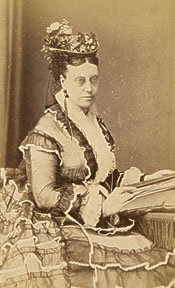Lydia Becker
| Lydia Becker | |
|---|---|

Lydia Becker
|
|
| Born | 24 February 1827 Cooper Street, Manchester, Lancashire, England |
| Died | 18 July 1890 (aged 63) Aix-les-Bains, Savoie, France |
| Cause of death | Diphtheria |
| Nationality | British |
| Education | at home |
Lydia Ernestine Becker (24 February 1827 – 18 July 1890) was a leader in the early British suffrage movement, as well as an amateur scientist with interests in biology and astronomy. She is best remembered for founding and publishing the Women's Suffrage Journal between 1870 and 1890.
Born in Cooper Street, Manchester, the oldest daughter of Hannibal Becker, whose father, Ernst Becker had emigrated from Ohrdruf in Thuringia. Becker was educated at home, like many girls at the time. Intellectually curious, she studied botany and astronomy, winning a gold medal for an 1862 scholarly paper on horticulture. Five years later, she founded the Ladies' Literary Society in Manchester. She began a correspondence with Charles Darwin and soon afterwards convinced him to send a paper to the society. In the course of their correspondence, Becker sent a number of plant samples to Darwin from the fields surrounding Manchester. She also forwarded Darwin a copy of her "little book", Botany for Novices (1864). Becker is one of a number of 19th-century women who contributed, often routinely, to Darwin's scientific work. Her correspondence and work alike suggest that Becker had a particular interest in bisexual and hermaphroditic plants which, perhaps, offered her powerful 'natural' evidence of radical, alternative sexual and social order.
In autumn 1866 Becker attended the annual meeting of the National Association for the Advancement of Social Science, where she was excited by a paper from Barbara Bodichon entitled "Reasons for the Enfranchisement of Women". She dedicated herself to organising around the issue, and in January 1867 convened the first meeting of the Manchester Women's Suffrage Committee, the first organisation of its kind in England.
Several months later, a widowed shop owner, Lilly Maxwell, mistakenly appeared on the register of voters in Manchester. She was not the first but she was a good opportunity for publicity. Becker visited Maxwell and escorted her to the polling station. The returning officer found Maxwell's name on the list and allowed her to vote. Becker immediately began encouraging other women heads of households in the region to petition for their names to appear on the rolls. Their claims were presented in court by Sir John Coleridge and Richard Pankhurst in Chorlton v. Lings, but the case was dismissed.
...
Wikipedia
